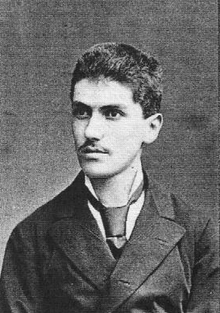Georg Alexander Pick
| Georg Alexander Pick | |
|---|---|

Georg Pick, 1885
|
|
| Born |
10 August 1859 Vienna |
| Died | 26 July 1942 (aged 82) Theresienstadt concentration camp |
| Nationality | Austrian |
| Fields | Mathematics |
| Institutions | Charles University in Prague |
| Alma mater | University of Vienna |
| Doctoral advisor | Leo Königsberger |
| Doctoral students | Charles Loewner |
| Known for |
Pick's formula Schwarz–Pick lemma Schwarz–Ahlfors–Pick theorem Nevanlinna–Pick interpolation |
Georg Alexander Pick (10 August 1859 – 26 July 1942) was an Austrian born mathematician. He was born in a Jewish family to Josefa Schleisinger and Adolf Josef Pick. He died in the Theresienstadt concentration camp. Today he is best known for Pick's theorem for determining the area of lattice polygons. He published it in an article in 1899; it was popularized when Hugo Dyonizy Steinhaus included it in the 1969 edition of Mathematical Snapshots.
Pick studied at the University of Vienna and defended his Ph.D. in 1880 under Leo Königsberger and Emil Weyr. After receiving his doctorate he was appointed an assistant to Ernst Mach at the Charles-Ferdinand University in Prague. He became a lecturer there in 1881. He took a leave from the university in 1884 during which he worked with Felix Klein at the University of Leipzig. Other than that year, he remained in Prague until his retirement in 1927 at which time he returned to Vienna.
Pick headed the committee at the (then) German university of Prague which appointed Albert Einstein to a chair of mathematical physics in 1911. Pick introduced Einstein to the work of Italian mathematicians Gregorio Ricci-Curbastro and Tullio Levi-Civita in the field of absolute differential calculus, which later in 1915 helped Einstein to successfully formulate general relativity.
...
Wikipedia
